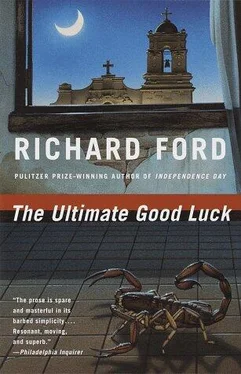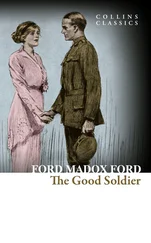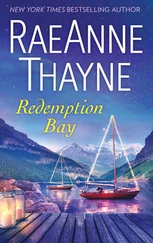“Momentito,” Bernhardt said. He smiled at Rae on the seat, and got out. He unlatched the steel shutters on his office, pushed up the door, and walked inside, switching on the lights.
The rooster and the carne carbón were gone. A scrim of papers was wadded against the façade, with the rock that had kept the rooster in its place used to hold the papers down. He watched Bernhardt at his desk, dialing the phone, looking silently out at the car. He could remember catching a frog in the saw grass along the Boardman River and bringing it home while his mother slept and letting it sit a long time in a pan of water on the back porch of the first house his father rented when they left the farm. He let the frog stay in the pan until late afternoon, when the frog had accustomed itself to the house air and grown calm. And when the frog stopped paddling and began to sit still for minutes at a time, he carried the pan in the house and down the hall to the kitchen and set it on the gas and lit the ring at the lowest flutter of flame and stood beside the stove and waited. The water in the pan began to heat at once, though the flame was low and the change was gradual. The frog sat in the water and looked up at him calmly and didn’t move. And little by little, he turned the knob and watched the flame fatten and turn bluer and the frog sit in the warming water looking out, blinking and breathing, though never moving, until suddenly a fizz sparked the edge of the water, and he saw that the frog would sit and stare out past the time when it could move even if it needed to, and he took the pan off the flame and held it under the kitchen tap and watched the frog blink and blink, its mouth opening a little and closing, beginning to paddle about until it could escape if the danger was from drowning and not from boiling. He thought later the frog in the pan was an illustration of how people let certain things they’re used to go on so long that they don’t know that the things they’re used to are killing them. And he wondered now, sitting in Bernhardt’s car, just when that point exactly was, and how you knew when it was close to you, and in the rare event you did know or could guess right, just what you did to keep yourself from getting burned.
A campesino turned the corner two blocks up Cinco de Mayo and started slowly down the hill toward the Centro. He was a small man in duck pants and a straw hat woven to give the brim a deep-swept country flange. He watched the man, noticed the way his feet moved near the ground, his gait regular and effortless as if he was accustomed to walking long distances. The man reminded him of the farmer with the goat in the palacio court the day before.
In the office Bernhardt had begun speaking into the telephone, watching the open door, his eyes moving. He picked up the letter opener and held it by the blade while he talked. There was no way to guess at the call, or its importance. It could be something else, and Quinn looked back at the campesino, who had crossed the Avenue Absalo and stopped under a lamp, gazing back up Cinco de Mayo as if he was searching for an address he had lost. The campesino had a rough beard, but his shoulders were loose and his head was erect and he was young. He stood in the streetlight ten meters ahead of the Mercedes, peering disconsolately back up into the darkness of the avenue, and Quinn could hear again, then, the low sibilance in the street, the soft ventral suspiration of any city, Chicago in the blue morning. Detroit deserted at the moment the sun set. It was the sound of sleep, and it put you at ease.
The campesino started suddenly toward the Centro, his sandals slapping the pavement quickly, though as he came in front of Bernhardt’s office his head turned as if he’d been surprised by the light, and his hands seemed to move excitedly under his poncho. There was a sudden loud expectoration of noise then, and the campesino was wrenched forward barging into the open door. The view to the office became lost then, but the light licked out either side of the man, printing him in the doorway as if he had stepped behind a shade. Quinn yelled into the whacking of the machine gun, but the campesino seemed to get smaller and kept the gun pointed in the office the entire time. There was a fountain of metal shot away from the man’s body, and then suddenly it stopped. And for a moment, almost a leisurely moment, there was no movement and no sounds anywhere, and it was as though what had happened, something he hadn’t even seen or been sure of, hadn’t happened, and everything remained the way it had been just a moment before.
Rae was crawling across the back seat on her knees, trying to reach the floor. He grabbed her head, losing his breath, and caught her front and back and squeezed until he could feel movement go back in a shudder down her spine. He put his face in her face and shook his head no . Rae’s eyes were large and expanding, her hair was falling around his hands, but she understood and went limp.
When he looked back the campesino was up Cinco de Mayo running toward the streetlight. He turned the corner onto the Avenue Absalo, where he had stopped a minute ago in the light, and disappeared. On the pavement there was half a gun of some kind with a long clip out the side and no stock, something Quinn imagined at that moment would be very hard to fire well. It had a length of cord tied to the barrel and the trigger guard, and it was rocking back and forth on the clip butt. There was a heavy odor of eggs fried too long on dry metal. And the time seemed to pass in a kind of dreamy slowness. Bernhardt was still inside the office, though the light there seemed much brighter and the air in the street too warm. Bernhardt had moved from where he had been. He was against the back wall and to the right, nearly out of the door frame. His pistol was lying in the middle of the floor in front of the clients’ chairs. His shirt was torn across the front and he was bleeding onto his arms. His face seemed unperturbed, but he was lying in a strange leg-over-hip position that Quinn recognized, and that no one who was alive would try to maintain. Bernhardt’s hand was tapping the tile floor spastically, but that movement didn’t mean anything.
He had squeezed Rae’s face until it was cold and there was a heavy faintness on her he could smell and that suddenly seemed suffocating. He shoved her up and toward the car door and said, “Out, get out,” and began struggling to get himself into the street.
Time seemed to speed up then, and he felt the need for cover. He thought he had at the most a minute, and then there would be no more chances.
Rae’s lips were pressed tightly against her teeth, and she seemed heavy and in danger of falling down. She hadn’t spoken, and he turned her toward Absalo in the direction the campesino had run, and where there were no sounds in the street and no motion up the flat façades. He couldn’t make himself think of Bernhardt, though he thought a lot would come to him later and that everything was changed beyond retrieval. Below them, the Centro lay in a smear of lights and trees, and beyond that above the buildings he could see the blue Corona Cerveza globe shining on the still night. Anyone who saw them now, he thought, would know where they came from, and it would be over.
“Don’t run,” he said. He reached back in the car, got his pistol, held Rae under the arm and shoved her. He took a last look at Bernhardt. He was small on the office floor. His glasses were on his face, but his shoes were off him as if he’d been blown completely out of them. The telephone was replaced in the cradle, and the wall behind where he had stood was unmarked. The campesino had hit him with every round he fired and only stopped when there wasn’t enough left to shoot at. It was skilled work, something Bernhardt wouldn’t have expected.
Читать дальше







![Theresa Cheung - The Dream Dictionary from A to Z [Revised edition] - The Ultimate A–Z to Interpret the Secrets of Your Dreams](/books/692092/theresa-cheung-the-dream-dictionary-from-a-to-z-r-thumb.webp)




